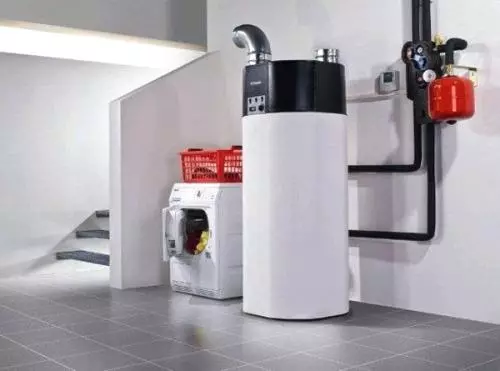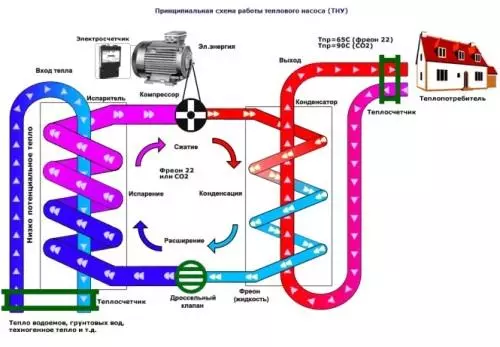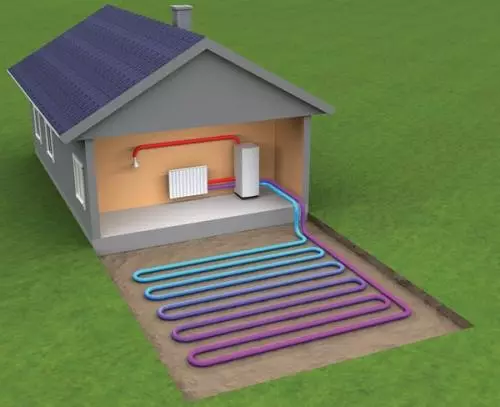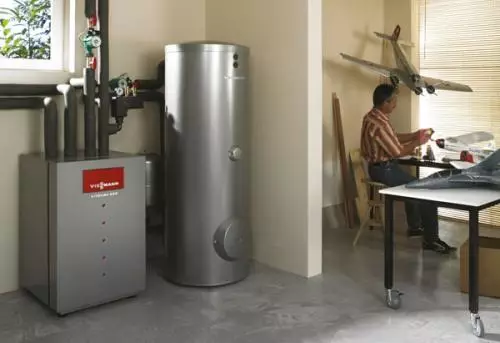
That is, the source of heat in this case is natural sources, and not products of combustion or electricity, which makes the heat pump most environmentally friendly and cost-effective today. Such a heating system is practically independent of fuel prices, because the energy of the earth, water and air is not only inexhaustible, but also absolutely free. The only costs during the operation of the heat pump are associated with electricity costs, from which the pump itself works, but they constitute only 1/3 of all the developed energy, so that the savings are obvious. Thus, the thermal pump at the cost of operation can even compete with the cheapest natural gas, not to mention solid or liquid fuel.
The very idea to extract heat from the environment is far from NOVA, but heat pumps, as a way of heating houses, appeared relatively recently in Western countries at the peak of the popularity of environmentally friendly and harmless equipment. It was in European countries that they began to establish them not only for private houses, but also for entire areas in cities.
How does the heat pump work?

The principle of operation of the heat pump resembles the principle of operation of the refrigerator, only on the contrary. If the working substance evaporates in the refrigerator, giving the cold, then in the heat pump it is condensed, giving heat. The resulting heat accumulates, enriched and is given to the coolant, which transfers it into heated rooms. To highlight heat in the system, a capacitor uses a capacitor, while the evaporator absorbs the resulting low potential heat.
Electricity is required by the compressor system. As an indicator of the efficiency of the heat pump, such a concept as a heat transformation or transformation is used is the difference between the value of the electricity consumed and the resulting heat. The efficiency of the system depends on the difference in the temperature of the evaporator and the condenser - the more, the lower the efficiency. To increase the performance efficiency, it is necessary to ensure the lowest possible source of low potential heat in volume, otherwise the system is possible overcooling.
Article on the topic: Build a summer shower: Just and cheap
Thus, the mass of the source of low potential heat should be significantly larger than the mass, which heats up, which will reduce the difference in the temperatures of the cold body and the heat source, and this, in turn, will reduce the consumption of electrical energy. The only drawback of such a solution is the significant dimensions of the heat pump, which are directly connected with its value. When heating such a system of districts and even cities can be installed expensive equipment that occupies a significant area - it is economically justified, but this is not always good for private houses.
Types of thermal pumps

Consider the performance characteristics and types of thermal pumps. As for the operating conditions, they can be used in a fairly wide temperature range from -30 ° C to +35 ° C. Compression and absorption pumps are most common. The first provide circulation in the system due to mechanical and electrical energy, the second tolerate heat using the heat source itself. Absorption pumps are more economical, but have a more complex design and are more expensive.
Depending on the type of heat source, thermal pumps can be divided into:
- Geothermal taking heat or water (groundwater, water bodies, etc.);
- air taking the heat of air;
- Pumps of secondary heat taking heat that is allocated during heating, workflows in production, etc. Usually such pumps are used in production, where there are sources of "unnecessary" heat.
Water, air, soil or combinations there can be used as a coolant in heat pumps.
Geothermal thermal pumps are closed and open. Open systems are used to heat the water, which falls into the contour, heats up and output. You can use such a system if nearby is a fairly large source of water with sufficient volume. In addition, the water passed through the system should not pollute the environment, and its release must be coordinated with government agencies.
Article on the topic: Interesting options for window curtains: design on a narrow wall with a window
More preferred are closed systems, which can also be divided into several types:
- With the horizontal arrangement of the collector, when it is mounted in the rolled in the ground below the ground freezing level. Depending on the climate and type of soil, the depth of the collector can vary, on the average it is about 1.5 m. To increase the area and the volume of the contour while reducing the reserved reservoir, the collector is better laying in rings. This type requires the presence of a significant free area, which is not always possible;
- With a vertical arrangement of the collector, when it is placed in a well at a depth of about 200 m. Such type is used in cases where it is not possible to select the desired area for the installation of the heat pump or the surface of the area is uneven;
- Water when the collector is mounted in a water branch (natural or artificial) at a depth below its freezing. In this case, the collector is also desirable to place rings for saving area. To install a water heat pump, some conditions must be observed: the volume of water in the reservoir should be sufficient to obtain the desired amount of heat, as well as the depth of the reservoir should be quite large so that the water in it does not freeze until the bottom.
Advantages and disadvantages of the heat pump

So, the heat pump is a combination of practically free heat and ecological purity. Why then do not everyone agree to change its traditional heat sources on it? The fact is that along with undoubted advantages, the thermal pump has some disadvantages. Consider in more detail the first and second.
Benefits
The advantages of the heat pump, as noted above, can include a slight consumption of electricity (to obtain 1 kW / h heat pump absorbs 0.3-0.35 kW / h) and environmental protection. In addition, the thermal pump has a high level of fire safety, does not require equipping an additional ventilation system and does not need regular maintenance. Regulation of the system operation is performed automatically without interfering. In fact, if you properly install it and connect, for 20 years you can simply forget about its existence and enjoy warmth in the house.Article on the topic: Pregnant - An important part of any bath
Another advantage is the possibility of not only the heating of the house in the cold season, but also its cooling in the summer. To do this, the Cold Ceiling and Feng Coyla system must be connected to the collector. Thus, the thermal pump will be able to replace air conditioners.
disadvantages
And now a few words about the lack of heat pump. The first (and main) of them is the high cost of equipment and installation. The heat pump has a rather complicated structure, besides equipped with automatic, which makes it quite expensive pleasure. In addition, its installation is associated with land work of large volumes, which significantly increases its value. If you decide to replace the gas heating system, the cost of re-equipment will pay for many years. At the same time, it is also necessary to take into account the fact that the average service life of the heat pump is 20 years, after which it is necessary to carry out overhaul of the system, which is due to the lands and the purchase of new elements. So, an explicit, at first glance, the benefit from the use of the heat pump at a closer look may be far from favorable, so it is better to calculate everything in advance and decide whether you need to install it.
Is it worth using a heat pump for home heating?
By summing up, it can be noted that the heat pump is a truly good alternative to existing heating systems. Perhaps in a few years its cost will decrease so much that the meaning of its installation will appear not only from environmental considerations, but also economic. In the meantime (at least in our country), the use of such equipment is unlikely to find widespread use.
